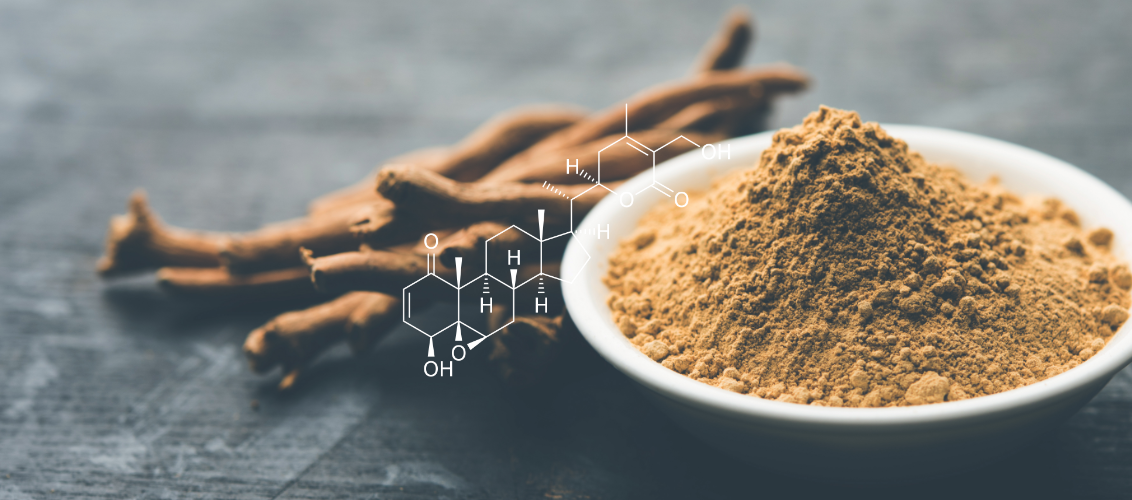
Benefits of Ashwagandha Super-Plant
What is Ashwagandha?
Ashwagandha (Withania somnifera), also known as winter cherry, poison gooseberry, or Indian ginseng, is an annual evergreen shrub that belongs to the Solanaceae or nightshade family. Ashwagandha combines the Sanskrit words 'ashva' and 'gandha', meaning horse and smell, respectively. The species name "somnifera" is a Latin word meaning "sleep-inducing". Ashwagandha is cultivated in India, the Middle East and some parts of Africa. Ashwagandha has many benefits, such as treating diseases and being used as dietary supplements.
Traditional uses of Ashwagandha
Ashwagandha is used traditionally to reduce stress, support vitality, and a healthy libido, and promote balance in the body. Ashwagandha is also used to support sleepiness, the nervous system, the endocrine system, and immune health.
Surprising facts about Ashwagandha
Ashwagandha is an evergreen bush that produces red berries. The berries look like husk cherries or tomatoes because they belong to the same family called Solanaceae of nightshades.
Ashwagandha originates from India but is now found in the Middle East, Mediterranean countries, and Africa.
Ashwagandha is also known as the winter cherry or Indian ginseng.
In Ayurveda, Ashwagandha has been used for more than 3,000 years to treat many health conditions such as arthritis, stress, snake bites, sleeplessness, memory loss, infertility, fever, and some gastrointestinal problems.
Ashwagandha is still used as ready for stress in Pakistan, Sri Lanka, and India to date.
In Sanskrit, Ashwagandha means the odor of the horse because its root produces an unpleasant odor like the smell of a horse. Ashwagandha is associated with a horse because it provides energy and strength like those of a horse.
Ashwagandha roots can be grated into a powdered form and consumed as tea.
Ashwagandha can adapt the body to any health condition, thereby achieving a balance of several systems.
Health benefits of Ashwagandha and why myAir bars contain it
1. Ashwagandha can help to lower blood sugar levels in the body
In several studies, Ashwagandha has been proven to reduce blood sugar levels in the body.
A test-tube study shows that Ashwagandha can help to increase insulin sensitivity and secretion in muscle cells.
Several human studies have also shown that Ashwagandha can lower blood sugar levels in healthy and diabetic patients. Additionally, a 4-week study of people with schizophrenia and treated with Ashwagandha shows that the models experienced an average reduction in fasting blood sugar levels of 13.5 mg/dL compared with 4.5 mg/dL in people who consumed a placebo.
Another small study of 6 people with type 2 diabetes using Ashwagandha as supplements for 30 days shows that the people reduced fasting blood sugar levels.
Ashwagandha can help increase insulin sensitivity and secretion, thereby reducing the blood sugar levels in the body.
2. Ashwagandha can help to reduce cortisol levels in the body
Cortisol is a hormone in the body that is released in response to stress and low blood sugar levels. However, cortisol levels may become elevated in some cases, leading to high blood sugar levels and high-fat storage in the abdomen.
Many studies have proven that Ashwagandha can help to lower cortisol levels in the body.
In a study of some overstressed adults, those who took Ashwagandha as supplements experienced a higher reduction in cortisol levels than those in the control group.
Ashwagandha supplements can help to reduce cortisol levels in stressed people.
3. Ashwagandha can help to increase muscle strength and mass
Researches have shown that Ashwagandha can boost body composition and also increase strength.
In a study to determine a safe and effective dosage of Ashwagandha, some healthy men who consumed about 750-1,250 mg of pulverized ashwagandha root daily experienced increased muscle strength and mass after 30 days.
In another study, those who consumed Ashwagandha experienced an increase in muscle strength and size. They also experienced doubled reduction in their body fat percentage compared with the placebo group.
Several studies have proved Ashwagandha to reduce body fat, increase muscle mass and increase strength in men.
4. Ashwagandha can help to lower anxiety and stress
Ashwagandha possesses the ability to reduce stress and anxiety in the body.
Many researchers have reported that Ashwagandha blocked the stress pathway in the brains of rats through the regulation of chemical signaling in the nervous system.
Also, many controlled human studies have proven that Ashwagandha can lower stress and anxiety disorders symptoms in humans.
A 60-day study of 64 people with severe stress who were given ashwagandha supplements experienced a 69% reduction in sleeplessness and anxiety compared to the placebo group, who experienced just an 11% reduction in their stress and anxiety rate.
A 6-week study of a group of people who consumed Ashwagandha reported that 88% experienced an anxiety reduction compared with a 50% reduction in those who took a placebo.
Some myAir bars are infused with Ashwagandha extract as part of the formulation designed for stress reduction.
Based on several studies, Ashwagandha lowers anxiety and stress in both humans and animals.
5. Ashwagandha can help to lower cholesterol and glycerides in the body
Ashwagandha possesses anti-inflammatory properties that may help boost heart health by reducing cholesterol and glyceride levels in the body.
Animal studies have also found that Ashwagandha significantly lowers blood fats levels in the body.
In a study of some rats, the researchers found that Ashwagandha reduced total glycerides and cholesterol levels by 45% and 53%, respectively.
Controlled human studies reported fewer results and also observed some impressive movements in the markers.
A 60-day study of some chronically stressed adults shows that the group taking the highest dosage of Ashwagandha extract experienced an 11% decrease in triglycerides and a 17% reduction in LDL (bad) cholesterol on average.
Ashwagandha can help to reduce cholesterol and triglycerides levels, thereby lessening the risk of heart diseases.
6. Ashwagandha can help to increase testosterone and boost fertility in man
Ashwagandha supplements have potent effects on testosterone levels and reproductive health.
In a study of 75 infertile men, the group treated with Ashwagandha experienced increased motility and sperm count. Ashwagandha led to an increase in testosterone levels in men.
Another study of some stressed men who consumed Ashwagandha showed higher antioxidant levels and better sperm quality. After 3 months of treatment, 14 % of the men’s wives became pregnant.
Ashwagandha can help to increase testosterone and boost sperm quality in men.
7. Ashwagandha help to enhance brain and memory function
Animal and test-tube studies suggest that Ashwagandha can improve brain and memory function.
Research has also shown that Ashwagandha can promote the buildup of antioxidants activity, thereby protecting the body's nerve cells from harmful free radicals.
In a study of rats with epilepsy treated with Ashwagandha, it was shown that the rats almost had a complete reversal of spatial memory impairment. This may be a result of a reduction in oxidative stress in the rats.
In a controlled study of some healthy men who consumed 500 mg of Ashwagandha extract daily, a report shows that the men experienced significant improvements in their task performance and reaction time compared with men who took the placebo.
In another 8-week study of 60 adults who took 300 mg of Ashwagandha root extract twice daily, the report shows a significant improvement in their attention, task performance, and general memory.
Ashwagandha supplements can help to enhance task performance, reaction time, memory, and brain function.
8. Ashwagandha can help to reduce inflammation
Several studies have shown that Ashwagandha can help to reduce inflammation.
Studies in humans have also found that Ashwagandha can increase the activity of natural killer cells, which combat infections and maintain good health. Furthermore, Ashwagandha can reduce markers of inflammation such as C- reactive protein (CRP), which is linked to an increased risk of heart diseases.
In a controlled study, the group of people who took 250 mg of Ashwagandha extract daily experienced a 36% decrease in CRP compared with a 6% decrease experienced by the placebo group.
Ashwagandha has been shown to increase the natural killer cell activity and reducing markers of inflammation.
Conclusion
Ashwagandha is a super herbaceous plant used to treat health conditions in the body. However, more research is needed to determine the full potency of this potent and nutritional plant. Good news - myAir bars are packed with Ashwagandha!
Footnotes
Efficacy and Safety of Ashwagandha (Withania somnifera (L.) Dunal) Root Extract in Improving Memory and Cognitive Functions
Dnyanraj Choudhary et al. J Diet Suppl. 2017
https://pubmed.ncbi.nlm.nih.gov/28471731/
Effect of standardized aqueous extract of Withania somnifera on tests of cognitive and psychomotor performance in healthy human participants
Usharani Pingali et al. Pharmacognosy Res. 2014 Jan.
https://pubmed.ncbi.nlm.nih.gov/24497737/
Oxidative stress-induced NMDA receptor alteration leads to spatial memory deficits in temporal lobe epilepsy: ameliorative effects of Withania somnifera and Withanolide A
Smijin Soman et al. Neurochem Res. 2012 Sep.
https://pubmed.ncbi.nlm.nih.gov/22700086/
Ashwagandha (Withania somnifera) reverses β-amyloid1-42 induced toxicity in human neuronal cells: implications in HIV-associated neurocognitive disorders (HAND)
Kesava Rao Venkata Kurapati et al. PLoS One. 2013.
https://pubmed.ncbi.nlm.nih.gov/24147038/
Hypocholesteremic and antioxidant effects of Withania somnifera (Dunal) in hypercholesteremic rats
Nishant P Visavadiya et al. Phytomedicine. 2007 Feb
https://www.ncbi.nlm.nih.gov/pubmed/16713218
In vivo enhancement of natural killer cell activity through tea fortified with Ayurvedic herbs
Jyoti Bhat et al. Phytother Res. 2010 Jan.
https://www.ncbi.nlm.nih.gov/pubmed/19504465
Protective effects of Withania somnifera root on inflammatory markers and insulin resistance in fructose-fed rats
Zahra Samadi Noshahr et al. Rep Biochem Mol Biol. 2015 Apr.
https://www.ncbi.nlm.nih.gov/pubmed/26989739
Examining the effect of Withania somnifera supplementation on muscle strength and recovery: a randomized controlled trial
Sachin Wankhede et al. J Int Soc Sports Nutr. 2015.
https://www.ncbi.nlm.nih.gov/pubmed/26609282
Exploratory study to evaluate tolerability, safety, and activity of Ashwagandha (Withania somnifera) in healthy volunteers
Ashwinikumar A Raut et al. J Ayurveda Integr Med. 2012 Jul.
https://pubmed.ncbi.nlm.nih.gov/23125505/
Withania somnifera Improves Semen Quality in Stress-Related Male Fertility
Abbas Ali Mahdi et al. Evid Based Complement Alternat Med. 2009.
https://pubmed.ncbi.nlm.nih.gov/19789214/
Withania somnifera improves semen quality by regulating reproductive hormone levels and oxidative stress in seminal plasma of infertile males
Mohammad Kaleem Ahmad et al. Fertil Steril. 2010 Aug.
https://pubmed.ncbi.nlm.nih.gov/19501822/
Withania somnifera Improves Semen Quality in Stress-Related Male Fertility
Abbas Ali Mahdi et al. Evid Based Complement Alternat Med. 2009.
https://pubmed.ncbi.nlm.nih.gov/19789214/
A prospective, randomized, double-blind, placebo-controlled study of safety and efficacy of a high-concentration full-spectrum extract of ashwagandha root in reducing stress and anxiety in adults
K Chandrasekhar et al. Indian J Psychol Med. 2012 Jul.
https://pubmed.ncbi.nlm.nih.gov/23439798/
A double-blind, placebo-controlled evaluation of the anxiolytic efficacy ff an ethanolic extract of Withania somnifera
C Andrade et al. Indian J Psychiatry. 2000 Jul.
https://pubmed.ncbi.nlm.nih.gov/21407960/
Direct evidence for GABAergic activity of Withania somnifera on mammalian ionotropic GABAA and GABAρ receptors
Manuel Candelario et al. J Ethnopharmacol. 2015.
https://pubmed.ncbi.nlm.nih.gov/26068424/
Effect of Withania somnifera root extract on spontaneous estrogen receptor-negative mammary cancer in MMTV/Neu mice
Kamel F Khazal et al. Anticancer Res. 2014 Nov.
https://pubmed.ncbi.nlm.nih.gov/25368231/
Withaferin A Induces Cell Death Selectively in Androgen-Independent Prostate Cancer Cells but Not in Normal Fibroblast Cells
Yukihiro Nishikawa et al. PLoS One. 2015.
https://pubmed.ncbi.nlm.nih.gov/26230090/
Molecular targets and mechanisms of cancer prevention and treatment by withaferin a, a naturally occurring steroidal lactone
Avani R Vyas et al. AAPS J. 2014 Jan.
https://pubmed.ncbi.nlm.nih.gov/24046237/
Hypoglycemic, diuretic and hypocholesterolemic effect of winter cherry (Withania somnifera, Dunal) root
B Andallu et al. Indian J Exp Biol. 2000 Jun.
https://pubmed.ncbi.nlm.nih.gov/11116534/
Effects of Withania somnifera in patients of schizophrenia: A randomized, double-blind, placebo-controlled pilot trial study
Akshay P. Agnihotri, Smita D. Sontakke, [...], and Vaidya Shishir S. Goswami
https://www.ncbi.nlm.nih.gov/pmc/articles/PMC3757622/
Hypoglycemic activity of withanolides and elicitated Withania somnifera
Jonathan Gorelick et al. Phytochemistry. 2015 Aug.
